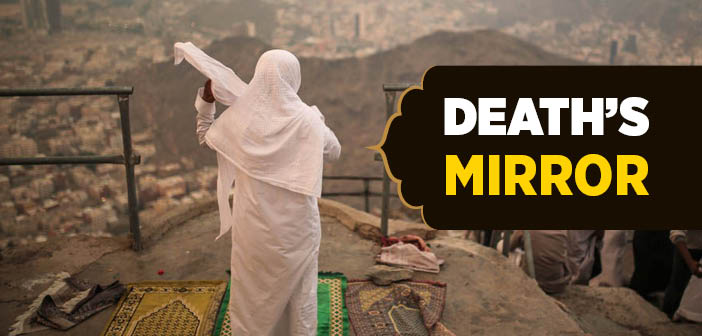What is the punishment in the grave? What is the punishment of grave in islam?
One of the matters concerning the Unseen which cannot be perceived directly with our senses and intellect, but which is confirmed through Divine Revelation, is punishment in the grave. Punishment in the grave is the torment that a person who does not obey the commandments of Allah will endure after death until the Resurrection. This punishment is referred to in some prophetic narrations as the trial of the grave.
According to a report by Sa’d ibn Abi Waqqas (may Allah be well pleased with him) the Messenger of Allah (may Allah bless him and grant him peace) used to seek refuge in Allah reciting the following supplication:
“O Allah, I seek refuge with You from cowardice and I seek refuge with You from miserliness. I seek refuge with You from reverting to the basest stage of life. I seek refuge with you from the trial of this world. I seek refuge with you from the trial of the grave.” (Bukhari, Jihad 25, Da’awat, 37, 41, 44)
Allah Almighty declares in the Qur’an concerning punishment in the grave:
“… If you could see the wrongdoers in the throes of death when the angels are stretching out their hands, saying, ‘Disgorge you own selves! Today you will be repaid with the punishment of humiliation for saying something other than the truth about Allah, and being arrogant about His Signs.” (Al-Ana’m, 6:93)
“And those who do wrong will have a punishment besides that but most of them do not know it.” (At-Tur, 52:47)
“Some of the desert Arabs around are hypocrites and some of the people of Madina are obdurate in their hypocrisy. You do not know them but We know them. We will punish them twice over and they will be returned to a terrible punishment.” (At-Tawba, 9:101)
According to Ahl-Sunna scholars, the Qur’anic verse which mentions Pharaoh and his clan being exposed to the Fire morning and evening, and their being subjected to severe punishment when the Last Hour comes,[1] as well as the verse which speaks of Prophet Nuh’s people being made to enter a punishing Fire after they were drowned in the Flood,[2] are Qur’anic indications of the torment in the grave.
Prophetic narrations also indicate that such forbidden acts as backbiting and gossip,[3] wailing in mourning,[4] dying with debt,[5] lying, fornication and adultery, consuming usury and drinking alcohol[6] are causes for punishment in the grave.
‘A’isha (may Allah be well pleased with her) relates:
“I never saw the Messenger of Allah (may Allah bless him and grant him peace) offer a prayer without seeking refuge in Allah from the punishment of the grave.” (Bukhari, Jana’iz, 87)
The companions Abu Juhayfa, Bara’ ibn ‘Azib and Abu Ayyub al-Ansari (may Allah be well pleased with all of them) reported:
“The Messenger of Allah (may Allah bless him and grant him peace) went out after the sun had set and heard a noise.
He said, ‘Jews being punished in their graves.'” (Bukhari, Jana’iz, 88; Muslim, Janna, 69)
The following question can come to mind here: We do not see any traces of punishment visible on any deceased person in their grave. For instance, how are they made to sit up in their grave, how are they questioned and how are some deceased persons punished with an iron hammer?
This can be said in response:
This is by no means impossible as there is something similar in this world. A sleeping person experiences pleasure or pain based on what they see in their dream, but nobody else senses a thing. A person who is awake is in the same way animated or saddened by a word they have heard or by a passing thought they have had, but the person right next to them might not be able to discern it.[7]
Zayd ibn Thabit (may Allah be well pleased with him) relates:
“The Messenger of Allah (may Allah bless him and grant him peace) was going with us to the dwellings of the Banu an-Najjar. He was riding a pony, which became frightened and nervous, and he nearly fell off. He found four, five, or six graves there and asked, ‘Which of you knows about those lying in these graves?’
Someone said, ‘I do.’ The Messenger of Allah (may Allah bless him and grant him peace) asked, ‘In what state did they die?’ The man replied, ‘They died as idol-worshippers.’
The Messenger of Allah (may Allah bless him and grant him peace) said, ‘These people are being put through an ordeal in their graves. Would it not stop you burying your dead in the ground, I would have certainly entreated Allah for you to hear it also.’
Then turning his face towards us, he said, ‘Seek refuge in Allah from the punishment of Hell.’
They replied, ‘We seek refuge in Allah from the punishment of Hell.’
The Messenger of Allah (may Allah bless him and grant him peace) said, ‘Seek refuge in Allah from the punishment in the grave.’
They said, ‘We seek refuge in Allah from the punishment in the grave.’
The Messenger of Allah (may Allah bless him and grant him peace) said, ‘Seek refuge in Allah from trials both the visible and invisible.’
They said, ‘We seek refuge in Allah from trials both the visible and invisible.’
The Messenger of Allah (may Allah bless him and grant him peace) said, ‘Seek refuge in Allah from the trial of the Dajjal, the (false) Messiah.’
They said, ‘We seek refuge in Allah from the trial of the Dajjal.'” (Muslim, Janna, 67)
Ibn ‘Abbas (may Allah be well pleased with him) relates:
“The Messenger of Allah (may Allah bless him and grant him peace) passed by two graves and said, ‘These two are being punished for a matter they deemed minor. One of them did not guard himself from urine and the other used to spread malicious stories and gossip.’
Then he called for a fresh leafless branch of a palm tree, split it into two, and inserted one half into each grave, saying, and ‘I hope that this will lighten their punishment for as long as these remain fresh.'” (Bukhari, Adab 49, Wudu’ 55-56, Jana’iz 82)[8]
As stated by the companion Abu al-Darda’ (may Allah be well pleased with him):
“O grave! How silent are you on the outside, while filled with horrors on the inside!”
Jabir ibn Abdullah (may Allah be well pleased with him) relates:
“When Sa’d ibn Mu’adh (may Allah be well pleased with him) passed away, we went with the Messenger of Allah to attend his funereal. After the Messenger of Allah led the funeral prayer, Sa’d was placed in his grave and the grave was levelled over. The Messenger of Allah (may Allah bless him and grant him peace) then glorified Allah repeatedly and we did the same. He then exalted Allah and so did we.
He was asked, ‘O Messenger of Allah, what made you glorify and then exalt Allah?’
‘The grave became constricted and tightened on this righteous servant, until Allah Almighty made it spacious for him.'” (Ahmad ibn Hanbal, III, 360, 377)
Ibn ‘Abbas (may Allah be well pleased with him) relates:
“The day Sa’d ibn Mu’adh (may Allah be well pleased with him) was buried, the Messenger of Allah, (may Allah bless him and grant him peace) stood by his grave and said, ‘Were anyone to have been saved from trial and questioning in the grave, Sa’d ibn Mu’adh would have been saved from it. But the grave closed in on him too, until Allah, glorified and exalted be He, expanded it for him.” (Tabarani, al-Mu’jam al-Kabir, X, 334; Haythami, III, 46)
[1] See (40:46).
[2] See (71:25).
[3] See Musnad, I, 225; Bukhari, Jana’iz, 88.
[4] See Bukhari, Jana’iz, 33; Muslim, Jana’iz, 16-28.
[5] See Ibn Majah, Sadaqat, 12.
[6] Bukhari, Jana’iz 92, Tabir 48.
[7] See at-Tibi, al-Kashif ‘an Haqa’iq as-Sunan, Makka al-Mukarrama, 1417, II, 590.
[8] Also see Muslim, Tahara, 111; Abu Dawud, Tahara, 11; Tirmidhi, Tahara, 53; Nasa’i, Tahara, 26; Jana’iz, 116; Ibn Majah, Tahara, 26.
Source: Osman Nuri Topbaş , Journey To Eternity, Erkam Publications





